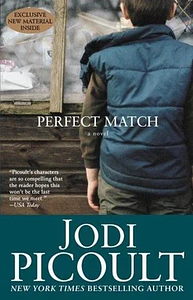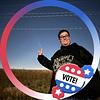Take a photo of a barcode or cover
"I am the woman who crossed the line. The one who actually did what any parent would want to do in this horrible situation. Every single person on that jury is looking at me and trying to figure out whether that makes me a monster or a hero." pg317
This book had me wondering whose side Picoult wanted us to be on - love or justice? The way it turns out tells me she believes that love should always win. But I'm afraid that, in this case, I was rooting for justice. Even if that meant a little boy would end up without his mother. In my opinion, she only had herself to blame. Her professions of doing it all to protect her son often rang empty to me. When she had the chance to be with him, when she should have been spending potentially her last moments of freedom with him, she chose not to. She chose to be in her own head, in her own space, ignoring him. Other than to wake him in the middle of the night to suddenly have a heartfelt chat.
I get that she thought she'd never have kids so to suddenly be blessed with a little boy was a miracle for her. I understand when she says she loves her son and, like many parents, would do anything to protect him. But Nina's words and her actions don't always line up. She worked too many hours leaving the majority of the parenting to her very 'motherly' husband. All the time she spent on her efforts to project her son may have been better spent with her son. She was so intent on doing what she thought was right, she seemed to ignore the idea of doing what was good and what was best.
The judge's final assessment that her anger justified her actions was based on her 'knowing' who did it. But at that stage, she didn't know for sure either way, didn't even have what she later thought was concrete evidence. That evidence to her justified her actions. But she didn't have that to base her actions on in the first place. After she found out she was doubly wrong, I'd have thought that making the rash decision of killing someone and finding out too late that it was the wrong someone, you'd question your own decision making abilitites going forward. But she just kept on assuming her 'rightness' and making stupid decision after stupid decision, never knowing when to just shut up and go spend time with her family!
I didn't like how this story turned out. And I didn't really like Nina much. But I like a book that has me talking to myself about how things are turning out.
This book had me wondering whose side Picoult wanted us to be on - love or justice? The way it turns out tells me she believes that love should always win. But I'm afraid that, in this case, I was rooting for justice. Even if that meant a little boy would end up without his mother. In my opinion, she only had herself to blame. Her professions of doing it all to protect her son often rang empty to me. When she had the chance to be with him, when she should have been spending potentially her last moments of freedom with him, she chose not to. She chose to be in her own head, in her own space, ignoring him. Other than to wake him in the middle of the night to suddenly have a heartfelt chat.
I get that she thought she'd never have kids so to suddenly be blessed with a little boy was a miracle for her. I understand when she says she loves her son and, like many parents, would do anything to protect him. But Nina's words and her actions don't always line up. She worked too many hours leaving the majority of the parenting to her very 'motherly' husband. All the time she spent on her efforts to project her son may have been better spent with her son. She was so intent on doing what she thought was right, she seemed to ignore the idea of doing what was good and what was best.
The judge's final assessment that her anger justified her actions was based on her 'knowing' who did it. But at that stage, she didn't know for sure either way, didn't even have what she later thought was concrete evidence. That evidence to her justified her actions. But she didn't have that to base her actions on in the first place. After she found out she was doubly wrong, I'd have thought that making the rash decision of killing someone and finding out too late that it was the wrong someone, you'd question your own decision making abilitites going forward. But she just kept on assuming her 'rightness' and making stupid decision after stupid decision, never knowing when to just shut up and go spend time with her family!
I didn't like how this story turned out. And I didn't really like Nina much. But I like a book that has me talking to myself about how things are turning out.
After reading "My Sister's Keeper," years ago, it's hard for me to find a Picoult book that compares. And in the end, her stories are a lot alike, about a child, a family in tragedy and the legal system. But, this book did surprise me, and I enjoyed it immensely, even knowing the thread of her stories. I'd have to say after "My Sister's Keeper," this was my next favorite Picoult book.
I love Picoult books. This had some twists and it pulled on my mind and heart. Truly a wonderful book.
Well, it's a Jodi Picoult book, that's for sure, but while the pieces are all there, they didn't seem, to me, to be put together all that well. Much of it felt like the material was overly bent and stretched to get it to fit the Picoult Pattern. It was not, for me, a satisfying read. Suspense, yes. Satisfaction, no.
emotional
reflective
medium-paced
Plot or Character Driven:
Character
Strong character development:
Yes
Loveable characters:
No
Diverse cast of characters:
No
Flaws of characters a main focus:
Yes
I really enjoyed this book. I felt like she really captured the effects of trauma and the emotional toll it can take on all the involved parties. I found my heart breaking over and over, and could really relate to the feelings of revenge that comes when someone has hurt a loved one.
I can't believe I stuck with this book. In the end I don't know why. I didn't like any of the characters and disliked the ending in particular. Yuck!




